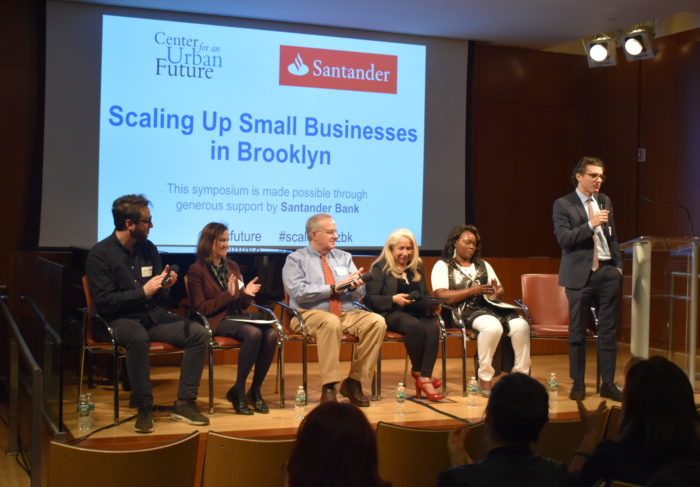How to Grow: the Challenge of Scaling up a Small Business
You need capital, great workers and affordable space–and the city could do more to help, say Brooklyn entrepreneurs
(Photo by Khakimullin/Bigstock)
The rent’s too high, banks won’t lend, young workers lack commitment, and politicians aren’t helpful enough. When asked to talk about the challenges of growing their businesses, a panel of Brooklyn entrepreneurs and small-business experts had no shortage of horror stories. Yet here they were, successful examples of Brooklyn’s vibrant small-business economy. The borough has about 50,000 businesses with 20 or fewer workers, an increase of about 40% since 2000.
“Brooklyn has something special going on when it comes to growing small business,” said Jonathan Bowles, executive director of the Center for an Urban Future, a think tank that convened Wednesday’s panel discussion at the Brooklyn Public Library, the first in a five-borough series. The subject–how to scale up–was chosen because the city produces many small businesses but, with colorful exceptions like Brooklyn’s Ample Hills Creamery, they tend to stay that way.
Defining his terms, Bowles said that growth doesn’t have to mean the exponential kind that excites venture capitalists, but could be something as small as a street vendor moving up to a storefront–or opening a second storefront. Small-business expansion is good for the city because it can help create more of the middle-class jobs that foster a stable urban economy. But expanding isn’t a breeze in the place Brooklyn has become in the last decade: an expensive environment that creates a lot of pressure to perform well.
Yet the assembled entrepreneurs had plenty of insights on how to succeed in spite of it all–and what can be done to help their fellow proprietors:
Capital Is the Biggest Challenge
The panelists tended to agree on this point: it can be hard for small business to be taken seriously by institutional lenders and investors. “You go to the big banks and they say you’re too small,” said Eladia Causil-Rodriguez, founder of the Brooklyn day-care chain Eladia’s Kids, now expanding to its sixth location. “But don’t give up. Those big banks are my friends now.”

The panel at the Brooklyn Public Library, from left: Noah Bernamoff, Nancy Carin, Edward Rogoff, Eladia Causil-Rodriguez, Alimata Zabsonre and moderator Jonathan Bowles (Photo by Steve Koepp)
Many entrepreneurs, especially in the early stages, have to rely on high-interest borrowing. “The No. 1 source of credit for people starting business is credit cards. That’s horrible!,” said panelist Edward Rogoff, dean of LIU Brooklyn’s business school.
Noah Bernamoff, founder of restaurants including the celebrated Boerum Hill deli Mile End and Black Seed Bagels, said that big institutions tend to have generic expectations for performance levels, rather than allowing for the special challenges of doing business in New York City. “To access bank capital, you have to achieve a certain level of performance,” Bernamoff said. When real-estate and labor costs are high, it’s hard to deliver results that compare with cheaper locales, he said. “I spend 50% of my time running a business and 50% running a network to generate ideas and funding. It’s nice to be social, but I feel like a politician sometimes.”
Commercial Real Estate Is Woefully Pricy
A decade ago, opening a business or new outlet in Brooklyn meant getting a break on rent, at least compared with Manhattan. Not so much anymore. The evidence can be seen in the blight of empty storefronts in some parts of the borough, caused by a combination of failed businesses, high expectations among landlords, and other factors. One painful issue for tenants is that many commercial leases require them to shoulder the burden of rising property taxes, which go up along with real-estate appreciation.
“The city hasn’t helped much with the problem,” said Nancy Carin, executive director of the Business Outreach Center Network. “The city is complicit in creating these high costs of occupancy. When real-estate taxes go through the roof, it pushes people out the door.” Bernamoff agreed: “The real-estate taxes are astronomical.”
Yet Rogoff offered a note of hope in that regard: “There a lot of signs that the commercial-space market is softening. Eventually the market wins and the prices will come down.”
Customers Need Loving Care, Now and Later
Alimata Zabsonre, owner of two outlets of Alima Hair Braiding, said she learned early to be accommodating, even with customers who couldn’t pay the full amount for the service right away. “Bring the balance next time you come,” she would tell them. “I don’t want to reject the customer, because I need her business. The first clients, if you don’t treat them well, they won’t bring the next ones.”

One of the smoked-meat sandwiches at Mile End deli, the first of Bernamoff’s restaurants (Photo courtesy of Mile End, via Instagram)
Bernamoff said the process of courting customers never really stops, especially in this ever-changing city. “Attracting and retaining customers is big. New York is a transient city, so every few years you kind of re-set your audience–and that’s unique to New York.”
Finding the Right Workers Is Crucial
When businesses expand, they need to become more systematic in their hiring process. For one thing, the proprietor can’t step in to fix every problem. “When we were one store with 20 employees, I was able to fill any job, from fixing a toilet to shoveling snow,” said Bernamoff, who now has 175 employees. “When you grow, that’s not possible.”
“Every single employee is critical to the outcome,” says Bernamoff, who notes that his industry’s labor force “is young, and far less committed than I remember being when I was a kid.” He prefers to hire full-time workers, vs. part-timers, since they’re more invested in the business.
However, to be able to attract skilled, middle-income workers, Bernamoff believes the city needs to address the issues of the high cost of living, as well as the problem-plagued transit system. “We have managers who can barely pay their rent” who live in neighborhoods far enough from work that they depend on the MTA. “And they’re 20 minutes late to work because the D train doesn’t move.”
Bowles asked whether the entrepreneurs have taken advantage of government workforce-development programs, which have tended to be used more by big business than small ones, an issue addressed in a report by his think tank. “Embarassingly, no,” said Bernamoff, who said his company has relied more on word of mouth and several online hiring platforms. “If it’s not a red light flashing in my face, I’m not going to see a resource from the state,” he said, which suggests that government needs more outreach to small business.
Politicians Need to Make Us a Priority
“Politicians all talk about helping small business,” said Rogoff, “and very few deliver on that.” While the new federal income-tax cut is likely to help many small businesses, some of the panelists pointedly said they weren’t looking to the federal government for any help, but want the city and state to do more.
City Council Member Robert Cornegy, who introduced the panel in his role as the outgoing head of the council’s Committee on Small Business–he now heads the Committee on Housing and Buildings–made the case that city government has stepped up its efforts to help. He pointed to Chamber On-the Go, a mobile team of business specialists he helped launch as a pilot program with the Brooklyn Chamber of Commerce that has now spread to all five boroughs. In 2016, he noted, the city passed a law prohibiting landlords from harassing their commercial tenants and providing a right to sue under the law.
Given the evident pressures, more could be done. In fact, at the end of the year, the City Council published a 69-page special report, called “Planning for Retail Diversity,” which catalogued a list of regulatory and zoning measures that could come to the aid of mom-and-pop businesses. “Many challenges persist. Chief among them is affordability,” Cornegy said. The council member also urged the city to fully fund the Career Pathways initiative, a program to boost workforce development in the city.
Technology Is Your Friend, If You Can Figure It Out
Rogoff urged small-business people to reach out for technical help, especially given that New York City is a tech hub with abundant talent. “Amazon does 5% of the retail business in America, but doesn’t compete with the people on this panel. They don’t operate day care, at least not yet. You need to get online,” he said.
Causil-Rodriguez said she had found great results with an app that replaces the little daily sheets that day-care centers give to parents to report on their children’s activities, like snacks and naps. When she first inquired about the app, she said, the CEO of the company came out from Los Angeles to meet her. “Once I implemented that, the growth was tremendous.” Bowles said that proprietors need to share their tech tips with one another. “If you hear from peers about tech, it’s quite persuasive.”

A scene from an Eladia’s Kids day-care center, which is now expanding to its sixth location, in Dumbo (Photo courtesy of Eladia’s Kids, via website)
Bernamoff, who said he uses a digital platform called Jitjatjo for short-notice hiring needs, emphasized the need for investing time in building and maintaing systems and tools, especially for a business that’s expanding. “Systems are the only way for us to scale, and scale in a way we’re proud of,” he said. “The toughest part of a system is the implementation of it. Implementation happens every day, all the time, forever.” When labor laws changed at the end of the year, he said, “It took eight one-hour conference calls, six hours with a labor attorney at $700 an hour, and we still have to implement it.”
Carin’s advice for business-development agencies: take a more active role in directly helping with technology. “Not everyone is an expert in all things,” she said, giving the example of search-engine optimization (SEO). “Don’t just give them a workshop on SEO–do it for them.”
Startups Get All the Love. What About Us?
Several panelists noted that startup businesses, especially in technology, get a lot of attention from funding and business-development groups. “There’s really an attraction to sexy startups. I think they disproportionately get the resources,” said Rogoff. “The question is always, Is it scaleable?, Is it scaleable?,” suggesting that companies with more modest growth potential are worthy as well.
Organized competitions, too, typically focus on startups. “How about competitions for existing businesses?,” asked Carin, “Not just startup competitions, but growth competitions.”
Getting Over the Anxiety
Some entrepreneurs, of course, don’t want to expand–they just want to endure. “Not everyone wants to grow. The idea of finding capital is not for everyone,” Rogoff said.
Others would like to, but worry about the risks and pressures. “I think first and foremost it’s fear in the entrepreneur’s mind,” said Bernamoff. “One of the biggest hurdles in growing 100%, from one store to two stores, was letting go of concern about every little detail and trusting others.”
Causil-Rodriguez, who now has 45 employees, said expansion actually helped her, because her second location proved to be more profitable than the first one. “You have to believe that you’re going to succeed. Be there day by day, never look back, always forward,” she said.
Is Brooklyn Past Its Prime Growth?
Bernamoff, who tended to play the curmudgeon on the panel despite the growth of his business, feels that the city has become too expensive to be the hotbed of innovation it was a decade ago. It was then, around the time of the financial crisis, that he dropped out of law school to open his first restaurant. So did quite a few of his peers. “I’ve seen a number of them close shop this year. We’re kind of reaching the end of the cycle,” he said.
“New York City is in an ebb state right now, to be frank,” he continued. “I feel a little uncomfortable with the state of things,” though he acknowledged that Brooklyn still produces plenty of new ideas and experimentation, despite the pressures.
Rogoff, the educator, offered a different take. “I’ll play the optimist here,” he said. “Everybody in the world wants to come here. That’s what feeds this, and it’s going to keep going.” While companies that primarily need lower costs and lighter regulation may move elsewhere, companies that need access to unique industries like finance and media–as well as highly skilled workers–will be inclined to stick around. To keep the growth engine humming, Rogoff said the city and state should focus more on infrastructure.
Causil-Rodriguez suggested that small-business operators need to stick together because they can create a virtuous cycle. She recalls that years ago when she opened a location on Flatbush Avenue, it was a bleak retail environment. “Nobody wanted to go there.” After she opened, an entrepreneur opened a coffee shop nearby. “Now, when 60 parents a day drop off kids, 60 parents go and get a cup of coffee.” The coffee-shop owner is now opening his third cafe. “Together, we are a big business,” she said.













